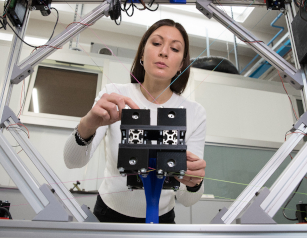
PNRR intervention area: Mission 4 – Education and Research
Component: 2 - From research to business
Investment: 1.3 - Extended partnerships with universities, research centres, businesses and research project funding
Duration: the project will end on 31/12/2025
Total project funding: €114,500,000.31
Proposer: Politecnico di Milano
How can the sustainability of Made in Italy production processes be promoted?
The aim of the project is to promote sustainability in key Made in Italy sectors, focusing on three strategic industrial sectors: clothing-fashion, furniture and automation.
The main actions are geared towards:
- innovation of production processes through digital solutions
- implementing eco-design principles to reduce environmental impact
- the development of sustainable materials, favouring recycled and reusable materials
Project structure and participation
Foundation Composition
Universities and research institutes
- Alma Mater Studiorum - Università di Bologna
- Politecnico di Bari
- Politecnico di Milano
- Politecnico di Torino
- Università di Roma La Sapienza
- Università degli Studi di Bergamo
- Università degli Studi di Brescia
- Università degli Studi di Firenze
- Università degli Studi di Napoli "Federico II"
- Università degli Studi di Palermo
- Università degli Studi di Padova
- Consiglio Nazionale delle Ricerche - CNR (National Research Council)
Private actors
- Aeffe Spa
- Brembo Spa
- Camozzi Group Spa
- Cavanna Spa
- Italtel Spa
- Itema Spa
- Leonardo Spa
- Natuzzi Spa
- Prima Additive Srl
- Sacmi Imola S.C.
- SCM Group Spa
- Stazione sperimentale per l’industria delle pelli e delle materie concianti Srl
- Thales Alenia Space Italia Spa
Areas of action
- Spoke 1 – Digital Advanced Design: technologies, processes, and tools (leader: Alma Mater Studiorum - Università di Bologna)
- Spoke 2 - Eco-Design Strategies: from materials to product-service systems (leader: Università degli Studi di Firenze )
- Spoke 3 - Green and sustainable products and materials from non-critical and secondary sources (leader: Consiglio Nazionale delle Ricerche - CNR (National Research Council)
- Spoke 4 - Smart and sustainable materials for circular and augmented industrial products and processes (leader: Università degli Studi di Napoli "Federico II")
- Spoke 5 - Closed-loop, sustainable, inclusive factories and processes (leader: Politecnico di Milano )
- Spoke 6 - Additive manufacturing as a disruptive enabler of the Twin Transition (leader: Politecnico di Torino )
- Spoke 7 - New and consumer-driven business models for resilient and circular supply chains (leader: Politecnico di Bari )
- Spoke 8 - Digitally-oriented factory design and management through AI and data driven approaches (leader: Università degli Studi di Padova )
The University of Bologna participates in Spoke 1, 2, 3 and 4. It is the coordinator for Spoke 1.
Project team
University of Bologna team
Scientific Coordinator
Prof. Flaviano Celaschi
Teaching and research staff
- Carolina Vittoria Beccari
- Lorenzo Bertin
- Marco Carricato
- Fabrizio Cavani
- Flaviano Celaschi
- Giovanni Emanuele Corazza
- Dario Croccolo
- Nikolaos Dimitratos
- Emilio Ferrari
- Elisa Franzoni
- Marco Gaiani
- Valentina Gianfrate
- Loris Giorgini
- Gustavo Marfia
- Claudio Melchiorri
- Serena Morigi
- Federica Muzzarelli
- Gianluca Palli
- Alberto Regattieri
- Chiara Samorì
- Andreas Sicklinger
- Francesco Maria Spampinato
- Ines Tolic
- Cristian Torri
- Maurizio Toselli
- Michele Zannoni
Staff hired with project funds
Researchers
- Francesca Calabrese
- Guido Carnevale
- Pasquale Cascarano
- Erik Ciravegna
- Lucia Ferrari
- Martin Huska
- Laura Succini
Research fellows
- Elena Benedetti
PhD students
- Amiza Amiza
- Andrea Brunetti
- Irene Calvi
- Giorgio Casoni
- Lorenzo Civolani
- Matteo Dalle Donne
- Valentina De Matteo
- Marion Josserand
- Rosato Ludovica
- Aqsa Majeed
- Veronica Pasini
- Ilaria Rinaldi
- Eleonora Stacchiotti
- Elisa Valzano
- Filippo Zoffoli
Departments involved
- Department of Chemistry "Giacomo Ciamician" - CHIM
- Department of Industrial Chemistry "Toso Montanari" - CHIMIND
- Department of Architecture - DA
- Department of the Arts - DAR
- Department of Electrical, Electronic and Information Engineering "Guglielmo Marconi" - DEI
- Department of Civil, Chemical, Environmental and Materials Engineering – DICAM
- Department of Industrial Engineering - DIN
- Department of Mathematics - MAT
The activities carried out by the university research teams in this project included:
- state-of-the-art analysis to map current sustainability practices in the industrial sectors analysed;
- the application of eco-design principles: sustainable design strategies have been explored and implemented, with the aim of reducing the environmental impact of finished products from conception to end-of-life;
- participation in 14 interdisciplinary projects, focusing on topics such as advanced design, virtual tools, digital twins, robotics and bio-based materials.
Some of the interdisciplinary projects under development include:
- 'Beyond the Space Life' a project for the development of a Digital Living Lab for human life in space (Spoke 1)
- 'Emotional' a project with the aim of analysing the history and development of ecology in the Italian context in order to influence digital and sustainable-circular Made in Italy (Spoke 2)
- 'Materials and processes for the ecological transition from plant biomass' (Wood, not Oil!), focused on the synthesis of polymers for Made in Italy using waste and scrap as raw materials (Spoke 3)
- 'ROOTS: gReen sOft rOboTicS" a project that aims to develop sustainable and environmentally friendly technologies for the soft robots of the future (Spoke 4)
Digital solutions and shared knowledge for circular production
Assistant professors at the University of Bologna are focusing on research activities in several areas:
- developing new digital solutions that enable designers and engineers to access, use and share the knowledge and resources needed for circular design, development and manufacturing processes
- to map and develop a portfolio of digitally enhanced solutions to support, augment and verify the design and decision-making process and to integrate circularity throughout the life cycle of products and machines
- developing sustainable technologies for the soft robots of the future
- creating a new sustainable supply chain for metal production through the fermentation of pyrolysis gases and steel mill gases

